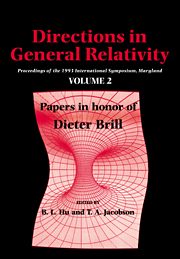 Directions in General Relativity
Directions in General Relativity Book contents
- Frontmatter
- Contents
- Contributors
- Symposium Program
- Papers from both Volumes Classified by Subjects
- Preface
- Dieter Brill: A Spacetime Perspective
- Thawing the Frozen Formalism: The Difference Between Observables and What We Observe
- Jacobi's Action and the Density of States
- Decoherence of Correlation Histories
- The Initial Value Problem in Light of Ashtekar's Variables
- Status Report on an Axiomatic Basis for Functional Integration
- Solution of the Coupled Einstein Constraints On Asymptotically Euclidean Manifolds
- Compact Cauchy Horizons and Cauchy Surfaces
- The Classical Electron
- Gauge (In)variance, Mass and Parity in D=3 Revisited
- Triality, Exceptional Lie Groups and Dirac Operators
- The Reduction of the State Vector and Limitations on Measurement in the Quantum Mechanics of Closed Systems
- Quantum Linearization Instabilities of de Sitter Spacetime
- What is the True Description of Charged Black Holes?
- Limits on the Adiabatic Index in Static Stellar Models
- On the Relativity of Rotation
- Recent Progress and Open Problems in Linearization Stability
- Brill Waves
- You Can't Get There from Here: Constraints on Topology Change
- Time, Measurement and Information Loss in Quantum Cosmology
- Impossible Measurements on Quantum Fields
- A New Condition Implying the Existence of a Constant Mean Curvature Foliation
- Maximal Slices in Stationary Spacetimes with Ergoregions
- (1 + 1)-Dimensional Methods for General Relativity
- Coalescence of Primal Gravity Waves to Make Cosmological Mass Without Matter
- Curriculum Vitae of Dieter Brill
- Ph. D. Theses supervised by Dieter Brill
- List of Publications by Dieter Brill
The Reduction of the State Vector and Limitations on Measurement in the Quantum Mechanics of Closed Systems
Published online by Cambridge University Press: 06 January 2010
- Frontmatter
- Contents
- Contributors
- Symposium Program
- Papers from both Volumes Classified by Subjects
- Preface
- Dieter Brill: A Spacetime Perspective
- Thawing the Frozen Formalism: The Difference Between Observables and What We Observe
- Jacobi's Action and the Density of States
- Decoherence of Correlation Histories
- The Initial Value Problem in Light of Ashtekar's Variables
- Status Report on an Axiomatic Basis for Functional Integration
- Solution of the Coupled Einstein Constraints On Asymptotically Euclidean Manifolds
- Compact Cauchy Horizons and Cauchy Surfaces
- The Classical Electron
- Gauge (In)variance, Mass and Parity in D=3 Revisited
- Triality, Exceptional Lie Groups and Dirac Operators
- The Reduction of the State Vector and Limitations on Measurement in the Quantum Mechanics of Closed Systems
- Quantum Linearization Instabilities of de Sitter Spacetime
- What is the True Description of Charged Black Holes?
- Limits on the Adiabatic Index in Static Stellar Models
- On the Relativity of Rotation
- Recent Progress and Open Problems in Linearization Stability
- Brill Waves
- You Can't Get There from Here: Constraints on Topology Change
- Time, Measurement and Information Loss in Quantum Cosmology
- Impossible Measurements on Quantum Fields
- A New Condition Implying the Existence of a Constant Mean Curvature Foliation
- Maximal Slices in Stationary Spacetimes with Ergoregions
- (1 + 1)-Dimensional Methods for General Relativity
- Coalescence of Primal Gravity Waves to Make Cosmological Mass Without Matter
- Curriculum Vitae of Dieter Brill
- Ph. D. Theses supervised by Dieter Brill
- List of Publications by Dieter Brill
Summary
“… persuaded of these principles, what havoc must we make?” — Hume
ABSTRACT
Measurement is a fundamental notion in the usual approximate quantum mechanics of measured subsystems. Probabilities are predicted for the outcomes of measurements. State vectors evolve unitarily in between measurements and by reduction of the state vector at measurements. Probabilities are computed by summing the squares of amplitudes over alternatives which could have been measured but weren't. Measurements are limited by uncertainty principles and by other restrictions arising from the principles of quantum mechanics. This essay examines the extent to which those features of the quantum mechanics of measured subsystems that are explicitly tied to measurement situations are incorporated or modified in the more general quantum mechanics of closed systems in which measurement is not a fundamental notion. There, probabilities are predicted for decohering sets of alternative time histories of the closed system, whether or not they represent a measurement situation. Reduction of the state vector is a necessary part of the description of such histories. Uncertainty principles limit the possible alternatives at one time from which histories may be constructed. Models of measurement situations are exhibited within the quantum mechanics of the closed system containing both measured subsystem and measuring apparatus.
- Type
- Chapter
- Information
- Directions in General RelativityProceedings of the 1993 International Symposium, Maryland: Papers in Honor of Dieter Brill, pp. 129 - 145Publisher: Cambridge University PressPrint publication year: 1956
- 1
- Cited by


